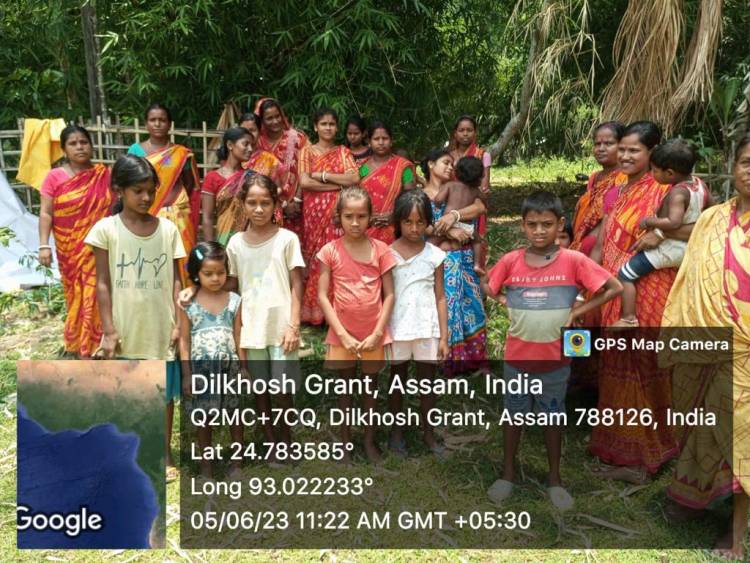[GHHF] World Environmental Day was Celebrated by Bala Samskar Students by planting 200 saplings and drawing pictures of trees.
 “Ether, air, fire, water, earth, planets, all creatures, directions, trees and plants, rivers and seas, they are all organs of God’s body. Remembering this a devotee respects all species.” (Srimad Bhagavatam, 2.2.41)
“Ether, air, fire, water, earth, planets, all creatures, directions, trees and plants, rivers and seas, they are all organs of God’s body. Remembering this a devotee respects all species.” (Srimad Bhagavatam, 2.2.41)
World Environment Day (WED) is celebrated annually on 5 June and encourages awareness and action for the protection of the environment. It is supported by many non-governmental organizations, businesses, and government entities, and represents the primary United Nations outreach day supporting the environment.
Sri Samrat Dutt, one of the Board members of GHHF, has taken immense interest in celebrating World Environment Day to highlight the importance of Panchabhutas in ancient scriptures. the GHHF Assam stated that Balasamskar Kendras of Assam celebrated World Environment Day.200 saplings were planted by Balasamskar students across three districts to mark World Environment Day. Art competition has also been organized by Balasamskar Kendras in collaboration with many Government schools on Environment Day. Teachers not only spoke about the importance of the environment but also talked about the Plants and trees' environment in Sanatana Dharma. Lastly, teachers also spoke a few things about the concept of Balasamskar Kendras and the activities of GHHF Assam.
First held in 1973, it has been a platform for raising awareness on environmental issues such as marine pollution, overpopulation, global warming, sustainable development, and wildlife crime.[3] World Environment Day is a global platform for public outreach, with participation from over 143 countries annually. Each year, the program has provided a theme and forum for businesses, non-government organizations, communities, governments, and celebrities to advocate environmental causes.
World Environment Day was established in 1972 by the United Nations at the Stockholm Conference on the Human Environment (5–16 June 1972), that had resulted from discussions on the integration of human interactions and the environment. One year later, in 1973 the first WED was held with the theme "Only One Earth".
Hinduism and Environmentalism
Hinduism teaches that the five great elements (space, air, fire, water, and earth) that constitute the environment are all derived from Prakriti, the primal energy. Each of these elements has its own life and form; together the elements are interconnected and interdependent.
Dr. Pankaj Jain stated in his article on Environmental Teachings Hinduism contains numerous references to the worship of the divine in nature in its Vedas,
Upanishads, Puranas, Sutras, and other sacred texts. Millions of Hindus recite Sanskrit mantras daily to revere their rivers, mountains, trees, animals, and the earth. Although the Chipko (tree-hugging) Movement is the most widely known example of Hindu environmental leadership, there are examples of Hindu action for the environment that are centuries old.
Hinduism is a remarkably diverse religious and cultural phenomenon, with many local and regional manifestations. Within this universe of beliefs, several important themes emerge. The diverse theologies of Hinduism suggest that:
• The earth can be seen as a manifestation of the goddess and must be treated with respect.
• The five elements -- space, air, fire, water, and earth -- are the foundation of an interconnected web of life.
• Dharma -- often translated as "duty" -- can be reinterpreted to include our responsibility to care for the earth.
• Simple living is a model for the development of sustainable economies.
• Our treatment of nature directly affects our karma.
Hymn to Mother Earth in Atharvana Veda:
‘Mother (earth) with your oceans, rivers, and other bodies of water, you give us land to grow grains, on which our survival depends…milk, fruits, water, and cereals as we need to eat and drink… please pour like a cow who never fails, a thousand streams for treasure to enrich me. May you, our motherland on whom we grow wheat, rice, and barley be nourished by the cloud and love by the rain’.
For the Purusha, the male principle the scriptures say: ‘The air is his breath, the trees are the hairs of his body, the oceans his waist, the hills and mountains are his bones, the rivers are the veins of the Cosmic Person, His movements are the passing of ages’.
DONATIONS
PayPal Method: To donate visit our website: savetemples.org. Click on the Donate button, then press the Purpose category, and select the General Donation category.
By Chek: Or you can send a check payable to GHHF, . It is tax-deductible.
By Zelle: ghhfusaorg@gmail.com
By Rupees, please contact us by either phone or email.
For more information, call in USA: Prakasarao V Velagapudi at 601-918-7111; in India: call Sreenivas at +91 83096 43979
Email: ghhfusaorg@gmail.com





















 Urgent support needed for Bangladesh Hindus
Urgent support needed for Bangladesh Hindus 







